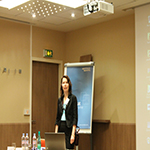Euroacademia Conferences
 Europe Inside-Out: Europe and Europeanness Exposed to Plural Observers (9th Edition) April 24 - 25, 2020
Europe Inside-Out: Europe and Europeanness Exposed to Plural Observers (9th Edition) April 24 - 25, 2020 Identities and Identifications: Politicized Uses of Collective Identities (9th Edition) June 12 - 13, 2020
Identities and Identifications: Politicized Uses of Collective Identities (9th Edition) June 12 - 13, 2020 8th Forum of Critical Studies: Asking Big Questions Again January 24 - 25, 2020
8th Forum of Critical Studies: Asking Big Questions Again January 24 - 25, 2020 Re-Inventing Eastern Europe (7th Edition) December 13 - 14, 2019
Re-Inventing Eastern Europe (7th Edition) December 13 - 14, 2019 The European Union and the Politicization of Europe (8th Edition) October 25 - 26, 2019
The European Union and the Politicization of Europe (8th Edition) October 25 - 26, 2019 Identities and Identifications: Politicized Uses of Collective Identities (8th Edition) June 28 - 29, 2019
Identities and Identifications: Politicized Uses of Collective Identities (8th Edition) June 28 - 29, 2019 The European Union and the Politicization of Europe (7th Edition) January 25 - 26, 2019
The European Union and the Politicization of Europe (7th Edition) January 25 - 26, 2019 7th Forum of Critical Studies: Asking Big Questions Again November 23 - 24, 2018
7th Forum of Critical Studies: Asking Big Questions Again November 23 - 24, 2018 Europe Inside-Out: Europe and Europeanness Exposed to Plural Observers (8th Edition) September 28 - 30, 2018
Europe Inside-Out: Europe and Europeanness Exposed to Plural Observers (8th Edition) September 28 - 30, 2018 Identities and Identifications: Politicized Uses of Collective Identities (7th Edition) June 14 - 15, 2018
Identities and Identifications: Politicized Uses of Collective Identities (7th Edition) June 14 - 15, 2018
European Parliament as a Cosmopolitan Parliament
-
-

-
Presentation speakers
- Helena Koutchoura, University of Strasbourg, Groupe de Sociologie Politique Européenne
- Download presentation
Abstract:
The uniqueness of the European Parliament among other parliaments in the world consists in its cosmopolitan character manifested in many ways. Firstly, the political groups in the European Parliament are transnational structures organized by political affiliation and not by nationality. However, political groups are made up of national delegations, and the heads of national delegations are important interlocutors for the chairs of the political groups. Secondly, cosmopolitanism of the European parliament is manifested through social and professional background of the MEPs which demonstrates a substantial number of international studies and international professional experience among the MEPs especially among the members of the political bodies of the European parliament. This paper will show that this trend concerns the MEPs from the new member states as well. Thirdly, cosmopolitanism of the European Parliament can be viewed through the Europeanization processes that affect national parties represented in the European parliament. The MEPs are recognized by their national parties as specialists in EU affairs. Providing an expertise in the EU politics to their national parties, the MEPs can influence the attitude of their national parties towards the EU and the European integration. Fourthly, speaking about the cosmopolitanism of the European parliament, it is important to take into account the socializing role of the European parliament for the MEPs independently of their political, professional and educational background even if the possibility of socializing capacities of the European institutions is still subject to debate in European studies due to some methodological problems. However, it is possible to perceive the evolution of opinions and attitudes of individual MEPs in the European Parliament using qualitative research methods. As the European Parliament is becoming more powerful and important actor in the political system of the EU, its cosmopolitanism contributes to the construction of the EU as a post-national order.
-
Related Presentations

The Role of External Perceptions in the European Identity Formation
- Irina Khayrizamanova

















